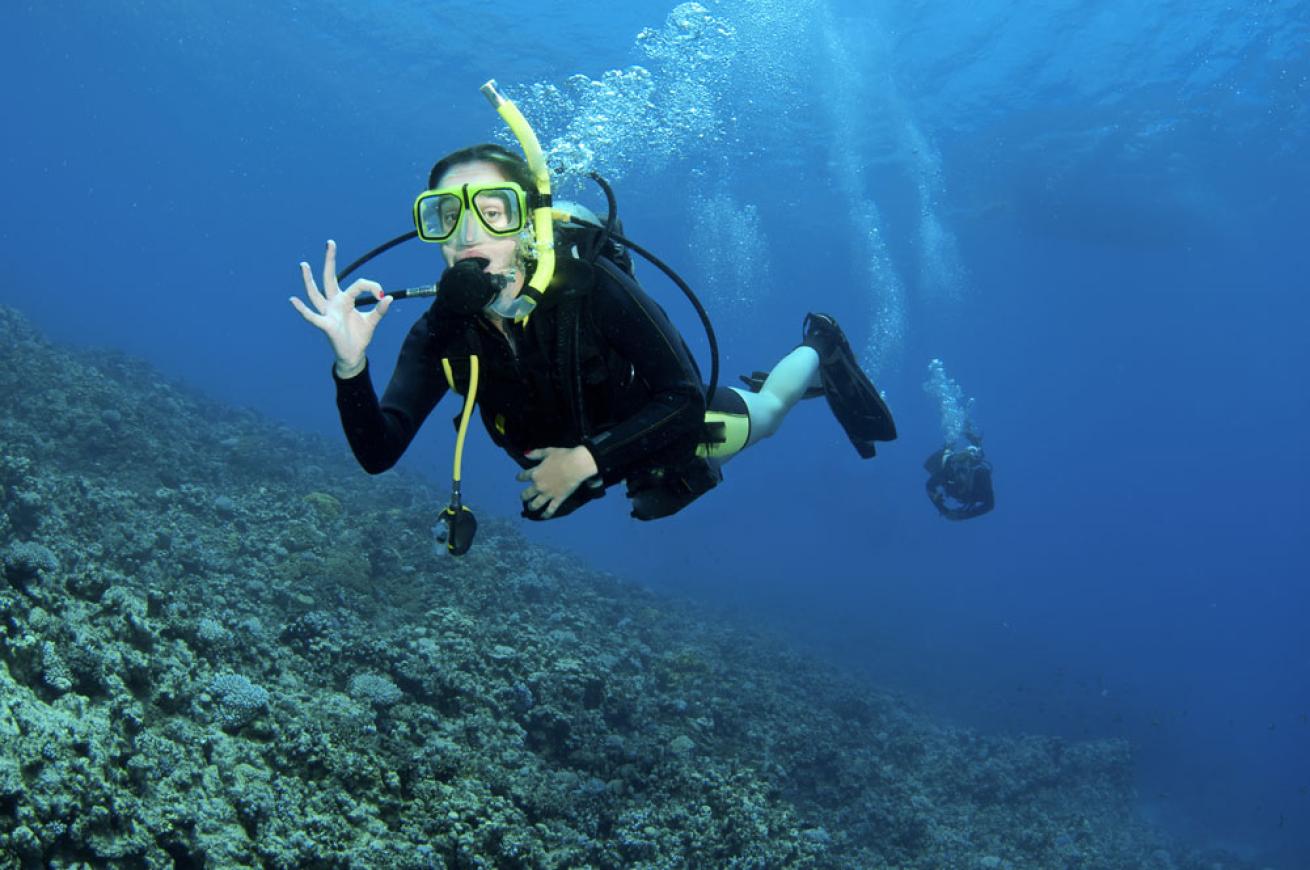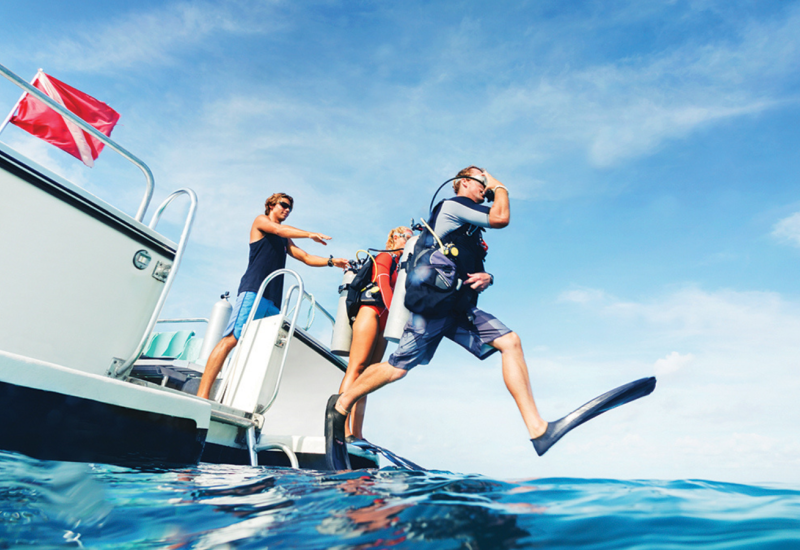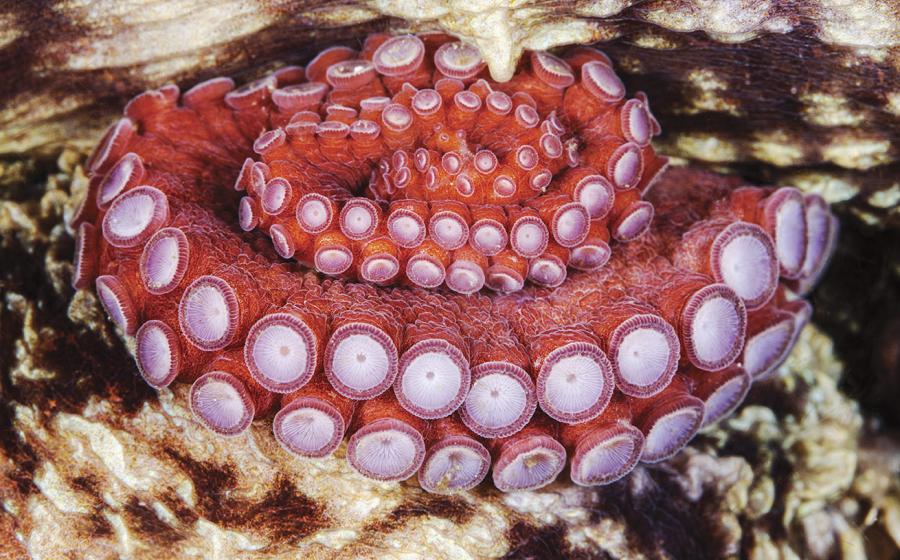Grace Under Pressure: Dealing with Panic Underwater

Stay calm when you begin to panic
By nature, most divers are as laid-back as Jimmy Buffett. We have to be to sail out to sea, toss on a tank and plunge into the dark unknown. Yet, there's a little Woody Allen dwelling within each of us, threatening to turn dangerously neurotic should the tides turn. That's the essence of panic. You go from cucumber-cool to scared, disoriented and out-of-control. Though new divers are more susceptible, experienced divers are also at risk, especially when a dive goes awry.
Panic can kill in many ways. Rapid, shallow breathing can cause hypoxia and a buildup of carbon dioxide. The result: The diver acts irrationally, breathing faster, expelling the regulator or bolting to the surface. These panic responses can make you pass out, or even have a heart attack if you have a weak heart. And panicking impedes your ability to solve problems and get to safety when your equipment malfunctions or you're tangled in a line.
The National Underwater Accident Data Center attributes about one-fifth of diver deaths directly to panic. Another 22 percent of fatalities cannot be attributed to a specific cause. But considering the number of divers found with working equipment, ample air supply and their weight belts firmly cinched, most experts believe that death due to panic is more common than we think.
What? Me Worry?
Trying to predict who will panic is a little bit like guessing who will win Survivor. With enough analysis, you could probably figure it out, but you're just as likely to be surprised, especially because panic strikes so many divers. A national survey from the mid-1990s shows that more than half of experienced divers reported having at least one panic or near-panic experience.
Not surprisingly, people who have panicked on dry land are at an increased risk for losing control and panicking under water. In a study published earlier this year, dive panic researcher and psychiatrist David Colvard, M.D., found that 45 percent of men and 57 percent of women with a history of panic reported panicking on one or more dives, compared to 19 percent of men and 33 percent of women who had never panicked before. "If you have been diagnosed with panic disorder, you should be very hesitant about jumping in the water," says Captain Marie Knafelc, M.D., Ph.D., who has performed nearly 20 years of diving research for the Navy. "If you really want to dive, find a very small class with a lot of personal attention and time in the water."
Some experts report that women are also at a higher risk for panic. The 1995 Sea Grant study from the University of Wisconsin-Madison found the incidence of panic was 64 percent among women compared to 50 percent among men. Knafelc is skeptical that predisposition to panic is really a genetic quality, however. "Women may be more likely to admit when they feel panicked," says Knafelc. And they're also more likely to get into diving because their partner wants them to rather than of their own accord, she says. "That immediately puts them in a more vulnerable position. Scuba is something you should really want to do for yourself."
Finally, people who tend to react to adversity with anxiety are also more likely to panic when faced with a flooded mask or a great white looming overhead. There are "trait anxiety" tests that could ferret out these nervous divers before they ever earn their C-cards, but most experts agree that's unrealistic. "Certified divers tend to fall in the lower range of trait anxiety to begin with, and the people who score high may simply be more anxious; they don't necessarily have panic disorder or other mental illness," says Colvard. Subjecting every potential diver to a psychological profile would be difficult, if not a violation of anti-discrimination laws.
The bottom line is that panic is something instructors need to address more seriously, and that participants need to prepare for more ardently, says Knafelc. "You need to honestly assess your own anxiety level. If you're a high-stress individual, you'd be wise to stay in the pool until you feel confident in your skills and ability to stay calm. If you are able to keep your wits, you can get yourself out of most any situation, even if your equipment fails."
Practice Makes Poised
Being scared under water is a rational fear, says Knafelc. "The only reason we're all not panicking all the time is that we're trained, so we know what to do." Enough knowledge, practice and preparation can soothe even the most anxious scuba enthusiast.
Rehearse the basics. Practicing basic skills is essential for preventing panic. "New divers especially need to rehearse important skills until they are burned into their psyche," says Colvard. Experienced divers also should brush up on the basics. Practice sharing air, clearing your mask and other skills you may not have done since certification. Visualize and mentally rehearse each dive.
Plan for emergencies. Panic happens when rational fears become irrational, says Knafelc. "Have an emergency procedure ready for every situation. Plan what you will do if you see a shark, have equipment failure or lose your buddy. Then rehearse those procedures with your dive buddy, so if something scary happens, you both automatically know what to do."
Remember "SBTA." Physiologically, it is almost impossible not to calm down when you're breathing slowly and deeply from your diaphragm, says Colvard. Train yourself to "Stop--Breathe--Think--Act" when something unexpected happens.
Come prepared. Having the proper equipment will bring you great peace of mind. Have a wetsuit for cold water, a backup light for night diving, and anything you need for special circumstances like wreck dives. Never fudge it or use equipment you aren't familiar with.
Listen to your instincts. If a dive doesn't feel right, don't do it. Period. Never dive beyond your training and abilities or push it when the conditions aren't cooperating.
Plan pauses. Prevent unpleasant surprises with pauses at every main transition, like when you enter the water, are at the bottom, before you ascend, at your safety stops and so on. Take a moment to assess your gear, your buddy and the environment.
Fix the little problems before they snowball into big ones and you'll go a long way to warding off panic, says Colvard. "It's usually not one thing that sends you over the edge, but a combination of unexpected factors."
When Panic Attacks
The following are classic signs that you're losing your cool. If you experience any of them, stop to relax, breathe, think--and seek help.
> Rapid breathing or feeling like you can't get enough air.
> Rapid heart rate, palpitations or heaviness in the chest.
> Gastrointestinal distress, "butterflies," nausea, vomiting or diarrhea.
> Muscle tension, headache or tremors.
> Trembling voice or inability to speak.
> Sweating, chills or hot flashes, feeling out-of-control or impending doom.
Scuba Diver photo by Shutterstock.com

By nature, most divers are as laid-back as Jimmy Buffett. We have to be to sail out to sea, toss on a tank and plunge into the dark unknown. Yet, there's a little Woody Allen dwelling within each of us, threatening to turn dangerously neurotic should the tides turn. That's the essence of panic. You go from cucumber-cool to scared, disoriented and out-of-control. Though new divers are more susceptible, experienced divers are also at risk, especially when a dive goes awry.
Panic can kill in many ways. Rapid, shallow breathing can cause hypoxia and a buildup of carbon dioxide. The result: The diver acts irrationally, breathing faster, expelling the regulator or bolting to the surface. These panic responses can make you pass out, or even have a heart attack if you have a weak heart. And panicking impedes your ability to solve problems and get to safety when your equipment malfunctions or you're tangled in a line.
The National Underwater Accident Data Center attributes about one-fifth of diver deaths directly to panic. Another 22 percent of fatalities cannot be attributed to a specific cause. But considering the number of divers found with working equipment, ample air supply and their weight belts firmly cinched, most experts believe that death due to panic is more common than we think.
What? Me Worry?
Trying to predict who will panic is a little bit like guessing who will win Survivor. With enough analysis, you could probably figure it out, but you're just as likely to be surprised, especially because panic strikes so many divers. A national survey from the mid-1990s shows that more than half of experienced divers reported having at least one panic or near-panic experience.
Not surprisingly, people who have panicked on dry land are at an increased risk for losing control and panicking under water. In a study published earlier this year, dive panic researcher and psychiatrist David Colvard, M.D., found that 45 percent of men and 57 percent of women with a history of panic reported panicking on one or more dives, compared to 19 percent of men and 33 percent of women who had never panicked before. "If you have been diagnosed with panic disorder, you should be very hesitant about jumping in the water," says Captain Marie Knafelc, M.D., Ph.D., who has performed nearly 20 years of diving research for the Navy. "If you really want to dive, find a very small class with a lot of personal attention and time in the water."
Some experts report that women are also at a higher risk for panic. The 1995 Sea Grant study from the University of Wisconsin-Madison found the incidence of panic was 64 percent among women compared to 50 percent among men. Knafelc is skeptical that predisposition to panic is really a genetic quality, however. "Women may be more likely to admit when they feel panicked," says Knafelc. And they're also more likely to get into diving because their partner wants them to rather than of their own accord, she says. "That immediately puts them in a more vulnerable position. Scuba is something you should really want to do for yourself."
Finally, people who tend to react to adversity with anxiety are also more likely to panic when faced with a flooded mask or a great white looming overhead. There are "trait anxiety" tests that could ferret out these nervous divers before they ever earn their C-cards, but most experts agree that's unrealistic. "Certified divers tend to fall in the lower range of trait anxiety to begin with, and the people who score high may simply be more anxious; they don't necessarily have panic disorder or other mental illness," says Colvard. Subjecting every potential diver to a psychological profile would be difficult, if not a violation of anti-discrimination laws.
The bottom line is that panic is something instructors need to address more seriously, and that participants need to prepare for more ardently, says Knafelc. "You need to honestly assess your own anxiety level. If you're a high-stress individual, you'd be wise to stay in the pool until you feel confident in your skills and ability to stay calm. If you are able to keep your wits, you can get yourself out of most any situation, even if your equipment fails."
Practice Makes Poised
Being scared under water is a rational fear, says Knafelc. "The only reason we're all not panicking all the time is that we're trained, so we know what to do." Enough knowledge, practice and preparation can soothe even the most anxious scuba enthusiast.
Rehearse the basics. Practicing basic skills is essential for preventing panic. "New divers especially need to rehearse important skills until they are burned into their psyche," says Colvard. Experienced divers also should brush up on the basics. Practice sharing air, clearing your mask and other skills you may not have done since certification. Visualize and mentally rehearse each dive.
Plan for emergencies. Panic happens when rational fears become irrational, says Knafelc. "Have an emergency procedure ready for every situation. Plan what you will do if you see a shark, have equipment failure or lose your buddy. Then rehearse those procedures with your dive buddy, so if something scary happens, you both automatically know what to do."
Remember "SBTA." Physiologically, it is almost impossible not to calm down when you're breathing slowly and deeply from your diaphragm, says Colvard. Train yourself to "Stop--Breathe--Think--Act" when something unexpected happens.
Come prepared. Having the proper equipment will bring you great peace of mind. Have a wetsuit for cold water, a backup light for night diving, and anything you need for special circumstances like wreck dives. Never fudge it or use equipment you aren't familiar with.
Listen to your instincts. If a dive doesn't feel right, don't do it. Period. Never dive beyond your training and abilities or push it when the conditions aren't cooperating.
Plan pauses. Prevent unpleasant surprises with pauses at every main transition, like when you enter the water, are at the bottom, before you ascend, at your safety stops and so on. Take a moment to assess your gear, your buddy and the environment.
Fix the little problems before they snowball into big ones and you'll go a long way to warding off panic, says Colvard. "It's usually not one thing that sends you over the edge, but a combination of unexpected factors."
When Panic Attacks
The following are classic signs that you're losing your cool. If you experience any of them, stop to relax, breathe, think--and seek help.
> Rapid breathing or feeling like you can't get enough air.
> Rapid heart rate, palpitations or heaviness in the chest.
> Gastrointestinal distress, "butterflies," nausea, vomiting or diarrhea.
> Muscle tension, headache or tremors.
> Trembling voice or inability to speak.
> Sweating, chills or hot flashes, feeling out-of-control or impending doom.
Scuba Diver photo by Shutterstock.com










